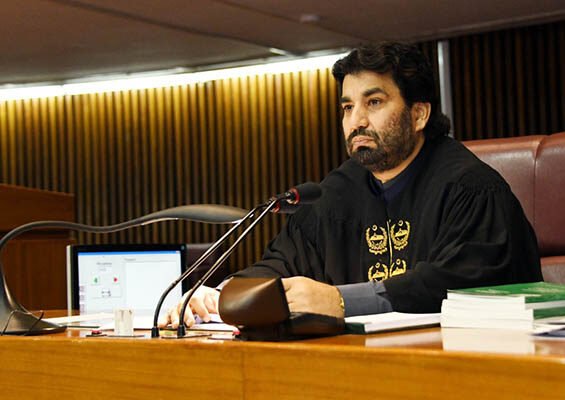By Zhang Niansheng, Wang Yunsong, Bai Yuanqi, People’s Daily
In 2014, with the joint efforts of the leaders of China and Fiji, the China-Fiji Juncao Technology Demonstration Center was established. Nine years later, the China-Pacific Island Countries Juncao Technology Demonstration Center (CPICJTDC) was unveiled in Fiji.
“The giant Juncao grass grows amazingly. It gets 5 to 8 centimeters taller per day in November,” said Lin Xingsheng, team leader of the China-Fiji Juncao Technology Demonstration Center.
“We have built a modern agricultural science and technology park covering an area of 3 hectares, integrating the ‘plant-fungi-animal‘ cycle. In addition, there is also a breeding base of about 10 hectares for Juncao seeds,” Lin added.
The Chinese technical personnel at the demonstration center actively explored and, based on the local climate and soil conditions, cultivated a variety of mushrooms using high-quality Juncao grass as nutrients, bringing tangible benefits to local farmers.
“The establishment of the demonstration center has ended the history of Fiji’s inability to grow mushrooms, making mushroom cultivation an emerging industry for prosperity,” said Ateleni Kaloumaira Vuinakelo, area field officer from Fiji’s Ministry of Agriculture and Waterways, who closely collaborated with Chinese experts in 2012 to introduce Juncao technology to Fiji.
Under the careful guidance of Chinese experts, the Fijian people gradually mastered the skills of cultivating over 10 varieties of edible mushrooms such as oyster mushrooms, ganoderma lucidum, and termite mushrooms, leading to a significant increase in income.
“Juncao technology has changed the agricultural development pattern of Fiji. Juncao grass can not only cultivate high-quality edible and medicinal mushrooms but also serve as high-quality feed, driving the development of animal husbandry. It is a ‘golden key’ for the people of Fiji to get rid of poverty and become prosperous,” Vuinakelo said.
Water systems are well developed within Fiji, but riverbank erosion is a major issue in the local riverside areas, leading to soil erosion and severe damage to the local ecosystem.
Sant Kumar, a former agricultural staffer now running a hectare of farmland on the outskirts of Nadi, Fiji, told People’s Daily, “The government invests significant funds each year in river channel management, but the results are minimal.”
During a technical training session, Kumar learned about the robust root system of giant Juncao grass and its ability to stabilize soil. Therefore, he planted this grass variety on the riverbank of his farm.
“They were like a dense net, firmly securing the fertile soil,” he said. Today, lush giant Juncao grass grows along the riverbank, effectively preventing landslides.
“Giant Juncao grass has also brought additional economic benefits,” Kumar said, pointing to the mature mango trees on the bank.
“The soil improved by giant Juncao grass is very suitable for growing fruits. Abundant fruits not only meet our own needs but can also be sold to multiple markets. The combination of Juncao grass and fruit trees has brought us substantial income. I recommend the government to vigorously promote this sustainable development model, so as to achieve a win-win situation for the economy and the environment,” Kumar noted.
According to statistics, the land planted with giant reed grass has experienced a 97.05 percent to 98.9 percent reduction in soil erosion compared to corn fields, and a decrease of around 80.0 percent to 90.9 percent in water loss.
“Giant Juncao grass has enormous potential in promoting ecological restoration and sustainable development. Its well-developed root system acts as a ‘barrier’ against soil erosion and a ‘remedy’ for land salinization,” said Su Ribai, an expert from the CPICJTDC.
“Many Fijians affectionately called Juncao grass as ‘grass of happiness‘ because it has helped many farmers escape poverty, improve their lives. The Fiji-China Juncao grass cooperation is a livelihood project that every household can join, not only cultivating agricultural professionals in Fiji but also providing new ideas for ecological governance in Pacific island countries,” said Vuinakelo.
In recent years, with the deepening of high-quality Belt and Road cooperation, ‘grass of happiness’ has not only entered numerous households in Fiji but also helped cultivate a large number of local talents who have grown into the backbone of the Juncao grass industry, injecting new vitality into local agricultural modernization.
Up to now, the demonstration center has successfully held more than 50 training sessions in Fiji, training over 2,700 local Juncao grass technical personnel.
Zhou Jian, Chinese Ambassador to Fiji, said: “As a demonstration project of South-South cooperation, Juncao technology has been applied and promoted in 106 countries and regions worldwide, contributing to 13 of the 17 Sustainable Development Goals set by the United Nations, and providing Chinese wisdom and solutions for poverty alleviation and ecological protection in many countries.”






 Today's E-Paper
Today's E-Paper